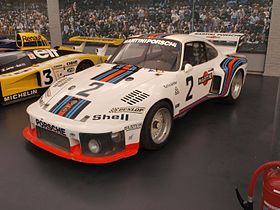Porsche 935
| Porsche 935 | |
|---|---|
 |
|
| Overview | |
| Manufacturer | Porsche |
| Designer | Norbert Singer |
| Body and chassis | |
| Class | Group 5 Special Production |
| Body style | 2-door coupé |
| Layout | RR layout |
| Platform | Porsche 911 |
| Related | Porsche 934, 930 |
| Powertrain | |
| Engine | Flat 6 turbo |
| Transmission | 4-speed, lockable differential |
| Dimensions | |
| Curb weight | 970 kg minimum required by rules |
| Chronology | |
| Predecessor | Porsche Carrera RSR (1974) |
| Successor | Porsche 961 |
The Porsche 935 was a racing car made by German carmaker Porsche, introduced in 1976. As the factory racing version of the Porsche 911 turbo prepared for FIA-Group 5 rules, it was an evolution of the Porsche Carrera RSR 2.1 turbo prototype, the second place overall finisher in the 1974 24 Hours of Le Mans.
Beginning with the 1977 season, Porsche offered the 935 to customers entering the World Championship for Makes, in the IMSA GT Championship and in the German Deutsche Rennsport Meisterschaft (DRM). The 935 went on to win the 1979 24 Hours of Le Mans overall, and other major endurance races, including Sebring, Daytona, and the 1000 km Nürburgring. Of the 370 races it was entered, it won 123.
Usually, no other make could challenge the Porsche 935, due to the availability of customer models. Each race, at the time, typically featured at least five 935s. The large turbocharger was used with mechanical fuel injection which caused turbo lag followed shortly by a fireball spitting from the exhaust and an enormous amount of power (up to 845 hp). The dominance of the 935 was ended by the FIA rules changes which came into effect in 1982, when the six numbered groups were replaced by only three groups, A, B and C.
For 1976, endurance racing had two world championships: the 1976 FIA World Championship for Makes for Group 5 special production cars, and the 1976 World Sportscar Championship season for Group 6 prototypes up to 3.0L. Accordingly, the 935 and the new Porsche 936 were the two-pronged Porsche effort for 1976 which was sponsored by Martini Racing, which had already supported Porsche 917 or 908 entries in 1970 and 1971, like the 1971 Le Mans winner.
...
Wikipedia
